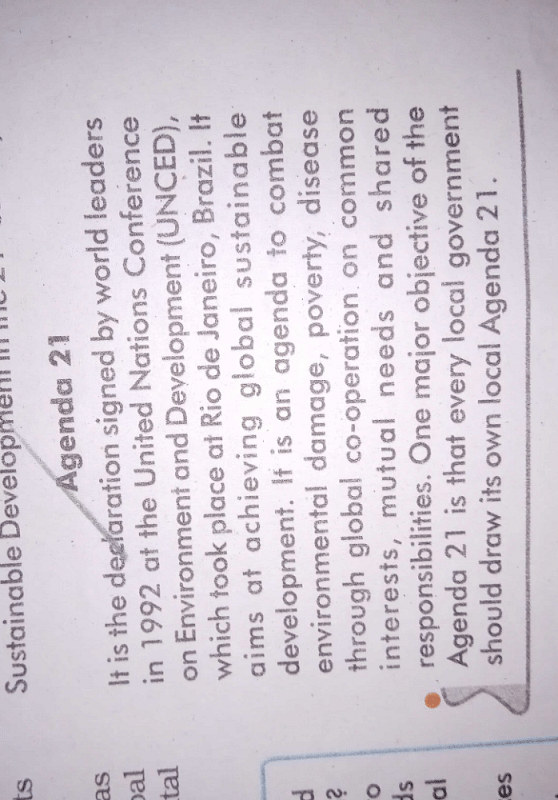Class 10 Exam > Class 10 Questions > What is Agenda 21?
Start Learning for Free
What is Agenda 21?
Community Answer
What is Agenda 21?
Agenda 21 is a comprehensive plan of action adopted by the United Nations Conference on Environment and Development (UNCED) held in Rio de Janeiro, Brazil in 1992. It is a blueprint for sustainable development that aims to balance economic, social, and environmental concerns to ensure a better future for all.
Goals and Objectives
The primary goal of Agenda 21 is to promote sustainable development worldwide. It aims to achieve this by:
- Protecting the environment: Agenda 21 calls for the protection of the Earth's ecosystems, including land, water, and air.
- Promoting economic development: It aims to promote economic growth that is sustainable and equitable, and that benefits all members of society.
- Ensuring social equity: Agenda 21 aims to create a world where people have equal access to resources and opportunities, and where basic human needs are met.
- Encouraging public participation: It recognizes the importance of involving the public in decision-making processes that affect their lives.
Implementation
Agenda 21 is not a legally binding treaty, but rather a voluntary action plan. It encourages governments, businesses, and individuals to take action to achieve its goals. Some of the ways in which Agenda 21 can be implemented include:
- Developing and implementing policies that promote sustainable development
- Encouraging the use of renewable energy sources
- Promoting sustainable agriculture and forestry practices
- Encouraging resource efficiency and waste reduction
- Promoting sustainable transportation options
- Encouraging the use of environmentally-friendly technologies
- Promoting education and public awareness about sustainable development
Criticism
Agenda 21 has been criticized by some who argue that it represents a threat to individual freedoms and property rights. Some have also questioned the effectiveness of the plan, arguing that it is too vague and lacks concrete goals and targets.
Conclusion
Agenda 21 is a comprehensive plan of action aimed at promoting sustainable development worldwide. While it is not a legally binding treaty, it encourages governments, businesses, and individuals to take action to achieve its goals. Despite some criticism, it remains an important framework for promoting sustainable development and creating a better future for all.
Goals and Objectives
The primary goal of Agenda 21 is to promote sustainable development worldwide. It aims to achieve this by:
- Protecting the environment: Agenda 21 calls for the protection of the Earth's ecosystems, including land, water, and air.
- Promoting economic development: It aims to promote economic growth that is sustainable and equitable, and that benefits all members of society.
- Ensuring social equity: Agenda 21 aims to create a world where people have equal access to resources and opportunities, and where basic human needs are met.
- Encouraging public participation: It recognizes the importance of involving the public in decision-making processes that affect their lives.
Implementation
Agenda 21 is not a legally binding treaty, but rather a voluntary action plan. It encourages governments, businesses, and individuals to take action to achieve its goals. Some of the ways in which Agenda 21 can be implemented include:
- Developing and implementing policies that promote sustainable development
- Encouraging the use of renewable energy sources
- Promoting sustainable agriculture and forestry practices
- Encouraging resource efficiency and waste reduction
- Promoting sustainable transportation options
- Encouraging the use of environmentally-friendly technologies
- Promoting education and public awareness about sustainable development
Criticism
Agenda 21 has been criticized by some who argue that it represents a threat to individual freedoms and property rights. Some have also questioned the effectiveness of the plan, arguing that it is too vague and lacks concrete goals and targets.
Conclusion
Agenda 21 is a comprehensive plan of action aimed at promoting sustainable development worldwide. While it is not a legally binding treaty, it encourages governments, businesses, and individuals to take action to achieve its goals. Despite some criticism, it remains an important framework for promoting sustainable development and creating a better future for all.
Attention Class 10 Students!
To make sure you are not studying endlessly, EduRev has designed Class 10 study material, with Structured Courses, Videos, & Test Series. Plus get personalized analysis, doubt solving and improvement plans to achieve a great score in Class 10.

|
Explore Courses for Class 10 exam
|

|
What is Agenda 21?
Question Description
What is Agenda 21? for Class 10 2024 is part of Class 10 preparation. The Question and answers have been prepared according to the Class 10 exam syllabus. Information about What is Agenda 21? covers all topics & solutions for Class 10 2024 Exam. Find important definitions, questions, meanings, examples, exercises and tests below for What is Agenda 21?.
What is Agenda 21? for Class 10 2024 is part of Class 10 preparation. The Question and answers have been prepared according to the Class 10 exam syllabus. Information about What is Agenda 21? covers all topics & solutions for Class 10 2024 Exam. Find important definitions, questions, meanings, examples, exercises and tests below for What is Agenda 21?.
Solutions for What is Agenda 21? in English & in Hindi are available as part of our courses for Class 10.
Download more important topics, notes, lectures and mock test series for Class 10 Exam by signing up for free.
Here you can find the meaning of What is Agenda 21? defined & explained in the simplest way possible. Besides giving the explanation of
What is Agenda 21?, a detailed solution for What is Agenda 21? has been provided alongside types of What is Agenda 21? theory, EduRev gives you an
ample number of questions to practice What is Agenda 21? tests, examples and also practice Class 10 tests.

|
Explore Courses for Class 10 exam
|

|
Suggested Free Tests
Signup for Free!
Signup to see your scores go up within 7 days! Learn & Practice with 1000+ FREE Notes, Videos & Tests.


























